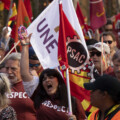The idea of mandatory national service rears its head from time to time. From the political Right, calls for national service are motivated by a desire to shore up patriotism, a shared sense of national identity, or the military. The political Left believes that national service can provide the solidarity or resources needed to address sweeping social programs.
But national service is not a feel-good project we should unite behind. Mandatory national service is slavery.
This bears saying because, as Arianna Huffington put it a decade ago, “national service is an idea that cuts across our stale Right-Left divisions and enjoys wide bipartisan support.” This support is perennial. Earlier this year, in the spirit of instilling us with a more robust national identity and addressing sweeping social problems, Ginny Roth made a pitch in The Hub for mandatory national service for every 18-year-old. She suggests offering a choice between civilian and military service. She argues we would shore up our military when the enlisted took that route and address labour shortages in elder care and childcare through civilian service by everyone else.
We do not care for the euphemism of “service”. This policy would amount to compelled labour for people who are not able to refuse. It is especially unfair that most young Canadians would be forced into service before ever being able to vote in a federal election.
One response to the claim that national service amounts to slavery is that sometimes—for example, in the case of a military draft in the face of an existential threat—it is necessary. We’re skeptical of its necessity even in that case (an existential threat seems like it should provide its own motivation). But note that this is not an argument that a military draft is not gussied up slavery. It’s an argument that sometimes there are problems so dire that slavery is a price we have to pay.
Roth’s call for national service does not—most calls for national service do not—even try to make the case that the problem is so dire.
Some might say that democratic implementation would imbue any law mandating national service with legitimacy and implied consent. We think it’s dangerous to say that if a majority votes away the rights of a minority then those rights are legitimately forfeit (especially given Canada’s past treatment of Indigenous and minority Canadians).
There are practical economic problems with Roth’s proposal as well. Forcing an entire age cohort into three sectors seems likely to affect labour availability outside of those sectors. This misallocation of labour would have spillover effects that would disrupt the entire economy.
Mandatory volunteering as a requirement for a secondary school diploma has not transformed Ontario into a province of people more devoted to service. What evidence is there to suggest that national service would create more civic-minded Canadians?
And how can we know that the injection of (inexperienced, unskilled) labour would be welcomed by the chosen sectors? Will the residents of nursing homes really benefit from an influx of unwilling workers whose only qualification is that they dislike that option the least? Knowing they will be gone in a year will the enlisted be given useful training, or will they sullenly mop floors while serving their time?
Milton Friedman famously quipped that an army of mercenaries is surely better than an army of slaves. This sentiment extends to other fields of national service.
Further, implementing such a law would require sweeping legal changes. It would and should face court challenges. If the program is ruled unconstitutional, will the government be required to compensate thousands of young Canadians who lost a year of their lives?
We are classical liberals. We believe that one of the proudest parts of this political tradition is its opposition to slavery. The abolitionism of Thomas Clarkson, the wholesale rejection of the slave state’s legitimacy by Lysander Spooner, and the stalwart opposition to the military draft by Milton Friedman are political legacies worth celebrating.
You don’t have to be a libertarian or classical liberal to see the moral objections to forcing thousands of Canadians to labour against their will. There are other, less problematic solutions to the problems this policy seeks to address.
For example, to address labour shortages we believe that significantly lower accreditation requirements for workers and allowing for on-the-job training could get more bodies in the door while reintroducing economic opportunity for more Canadians, especially those with relevant work experience outside Canada. If the government has a role, it should focus on regulating the safety and quality of the services provided rather than strangling innovation by micro-managing the ways that people may provide those services.
We are incorrigible peaceniks and worry that a larger military would encourage foreign intervention. Given thousands of additional soldiers, perhaps the Canadian government would join more ill-conceived adventures, like the Iraq War. Requiring the recruitment of willing volunteers helps to hold military leadership to account. Forcing thousands of young Canadians into service will make it easier for the military to get away with bad behaviour—something with which it already struggles.

As to the claim that mandatory national service would instill a shared sense of purpose and identity among all Canadians, we insist that the enslavement of young Canadians is no basis for a sense of pride.
Maybe you’re not convinced by our arguments. We hope they at least instill enough doubt to convince you that the proponents of national service cannot clear the very high bar needed to justify a national program of forced labour.
There are many ways that we can serve each other, and we should make an effort to find the ones that matter to us. Find a worthy cause and donate your time or money. Help a neighbour who could use it. Consider joining the military or building a career in elder or child care.
But the equal dignity with which we should treat our fellow Canadians demands that we let them make that choice as freely as we make ours.
Recommended for You

Why violent crime is surging in Canada: DeepDive

If Canada wants stronger communities, it must make volunteering easier

Why Ottawa’s proposed hate speech law is proving so controversial

More than 1 in 5 Canadians now works for government—and the share is rising



